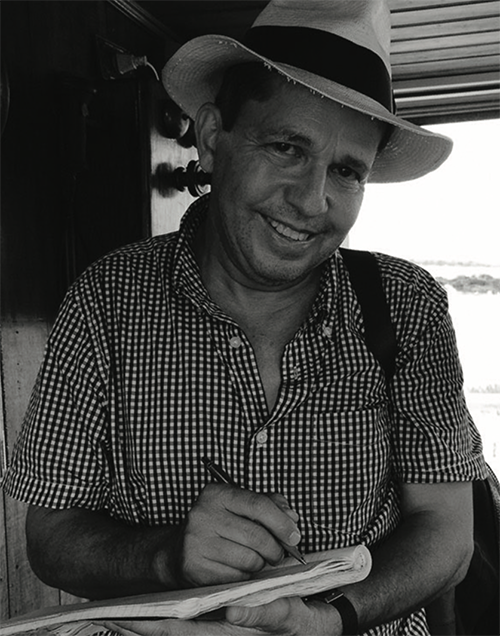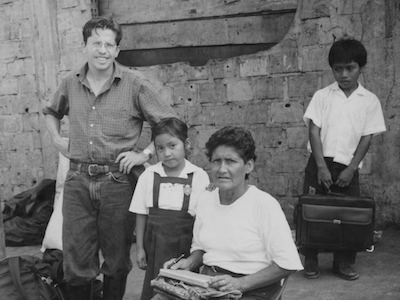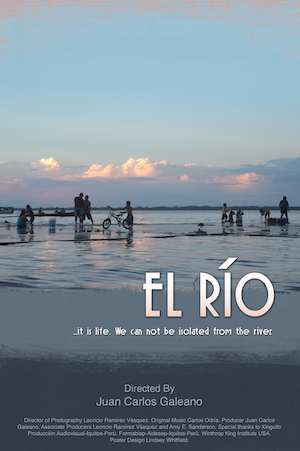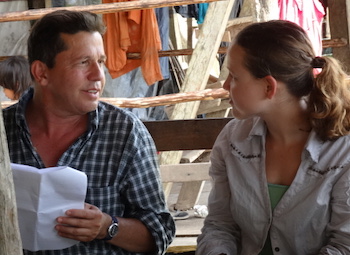A traveler between cultures

A little piece of home hangs in the office of poet, folklorist and filmmaker Juan Carlos Galeano: a llanchama painting, made from tree bark typically used as clothing or canvas by indigenous groups in the forests and rivers of Amazonia.
Like the llanchama, Galeano, who is originally from the Caquetá River area of the Amazonian region of Colombia, has woven the Amazon into all that he does as a professor of Spanish at Florida State University and as a scholar of intersecting disciplines. His canvas is the environmental humanities, which combine the natural sciences with the creative arts, ethics and other disciplines to explore the relationship between nature and culture. The people of Amazonia have been weaving these elements together into cosmovisions, illustrated through stories and lifeways, for millennia.
Galeano’s research focuses on these “cosmovisions” — symbolic oral narratives passed down through generations that reveal how Amazonian indigenous people perceive the world and humanity’s place in it — and he captures these tales in poetry, folklore anthologies and documentaries.
“My research on cosmovisions of the Amazonians and the practice of writing poems are connected,” said Galeano, a faculty member in FSU’s Department of Modern Languages and Linguistics. “Poetry is a path that allows us to feel the world with others. It is an acknowledgment that we are part of the whole, not the center.”

environmental humanities. Courtesy photo.
Working within the realms of the Spanish language, Latin American poetry and the cultures of the Amazon Basin, Galeano seeks new ways to bring about environmental awareness that may influence Western culture. The indigenous people of Amazonia perceive non-human surroundings differently. Stories of pink dolphins, clouds, serpents, trees and rivers — considered sentient beings — have all found their way into Galeano’s work.
“Today, we are in the fortunate position of having our field recognized for its importance at the highest levels of science. But what changes people’s hearts and minds are stories,” said Joni Adamson, Galeano’s colleague and a professor of English and environmental humanities at Arizona State University.
“Dr. Galeano’s work has been recognized for its power to tell an important story in ways that potentially convince his audiences to care not only about pink dolphins and anaconda but the entire Amazonian rainforest, which is critical to the survival of the Earth,” Adamson said.
Galeano is a committed member of the Humanities for the Environment Global Network and director of the Latin American Observatory. His work has been published and translated into languages including Chinese and Italian and appears in notable journals. His worldwide poetry readings include a presentation at the renowned Medellín International Poetry Festival in Colombia. He has also worked with indigenous organizations and peasant communities on projects that support a sustainable way of life in the Peruvian Amazon.

"El Rio." Courtesy photo.
From page to screen
For Galeano, what began in poetry and folklore later developed into a series of ongoing and diverse projects that include documentary film- making. He co-directed and produced the 2009 film “The Trees Have a Mother,” an exploration of indigenous belief systems and myths related to the natural world, set in the Peruvian Amazon.
His most recent documentary revolves around Amazonian river spirits and their role in the modern world. “El Rio” was recognized with the Gaia Award in February at the Cinema Verde International Environmental Film and Arts Festival in Gainesville, Florida. It was officially selected in April for the 2019 Annual Ethnografilm Festival in Paris.
Classroom in Amazonia
Galeano’s dedication to environmental humanities and awareness is reflected in the perspective he brings to his students at both the undergraduate and graduate levels. While at FSU, William Boose, a 2018 FSU graduate in history and Spanish, journeyed to the Peruvian Amazon multiple times under Galeano’s guidance to conduct research.
“My visits to the Amazon have impacted not just my everyday life but the trajectory of my career and personal development,” said Boose, whose work was funded in part by an FSU IDEA Grant. “The people of Iquitos, Peru, and the surrounding indigenous communities are incredibly welcoming, brilliant and creative, and they kindly shared a lot of wisdom with me regarding the environment.”
Diego Mejía, a Ph.D. candidate in Spanish, says working with Galeano at the graduate level is an inspiring and enriching collaborative experience.
“I think environmental humanities are an important tool, a bridge between fields considered unrelated,” Mejía said.

Spanish at Florida State University. Courtesy photo.
‘A natural mentor’
Martin Munro, an FSU Eminent Scholar and Winthrop-King Professor of French and Franco- phone Studies, shares the belief that literature and oral culture are means of expressing one’s relationship with the world.
“[Galeano] is a natural mentor and has taken many of our students to the Amazon. This is a great sacrifice for any faculty member, but he does it as it is part of his natural inclination to share his work and his passion for the Amazon,” Munro said. “He is also a kind and supportive colleague. He is 100 percent committed to his work. For him, it is like a mission, and we are lucky to have him at FSU to share his passion and knowledge.”
Galeano’s programs and methods both in teaching and in creative research are recognized and sought after by other institutions. He is helping to develop a study-abroad program in the Amazon for the summers of 2019 and 2020, sponsored by Montana State University, Billings’ international studies program and Rutgers University’s honors program.
Gabriella Paez graduated from FSU in May with a bachelor’s degree in English with a concentration in editing, writing and media.

